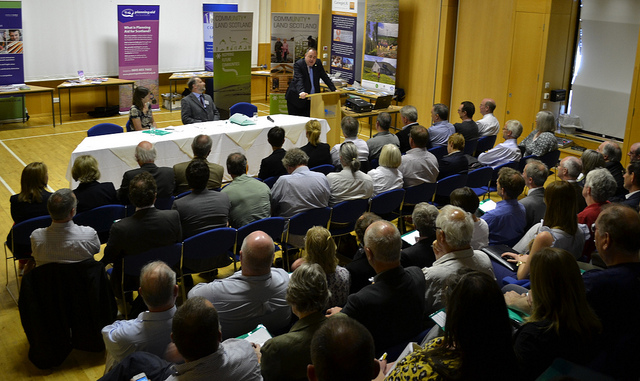Yes or no, the Scottish Independence Referendum has been good for democracy on both sides of the border
Scotland finally goes to the polls today to decide on its status as either a newly independent nation, or a part of the United Kingdom. The result looks set to be close, but whatever happens, argue Sean Kippin and Carl Cullinane, the referendum has been a remarkable boon for democracy and political engagement on both sides of the border.
Voters in the Scottish independence referendum go to the polls today in what promises to be a dramatic 24 hours for the United Kingdom. While the ‘No’ camp clings to a narrow but steady lead, both sides are optimistic of victory.
The ‘Yes’ campaign has been emboldened by Alex Salmond’s strong performance in the second televised debate and the subsequent narrowing of the polls, including several that showed ‘Yes’ in a dramatic lead. The campaign has ignited in recent weeks, on both sides of the border, as what seemed like a foregone conclusion swung back in the balance. Nonetheless, it would still be a surprise were Scotland to ultimately vote ‘Yes’. In July, John Curtice noted that in over 60 opinion polls to date, only one had recorded a majority support for independence. Despite the surge in support, this number has only increased to three, with most polls still showing a narrow lead for the pro-Union side.
Pro-independence campaigners counter that late surges in SNP support have accompanied their two victories in Scottish Parliament elections and that the expected high turnout makes voter behaviour very difficult to predict, particularly with so many new members of the electoral register. Even so, the smart money remains on victory for the unionist campaign.
If this is the case, it will certainly not be the end of the matter. While a ‘Yes’ vote is a one way street, the same cannot be said of a ‘No’ vote. It is likely that there will, at some point in the future, be a further referendum on the same question. Despite the reluctance of many in Scotland to fall into a cycle of ‘neverendums’, the SNP’s strong domestic position allows for the possibility of the question being asked again, in the medium term, if not the short term. As Emran Mian has argued, Westminster must not fall into the trap of thinking that a ‘No’ vote represents a conclusion with any degree of finality. The events of the last few weeks will surely have put paid to that possibility.
At times, the referendum campaign has felt like Scots are being offered a choice between maintaining an essentially unsatisfactory status quo and embracing a risky and unknowable future alone, but the status quo is one option that Scottish voters don’t really have. While the ‘Yes’ and ‘No’ camps disagree on a great deal, they do largely sing with one voice on the need for the Scottish Parliament to be a more powerful body in the future than it is today. DevoMax increasingly looks to be the most likely outcome of a ‘No’ vote. In that regard, the choice facing voters today is one of degree rather than absolutes.
While most attention has been paid to the core issues of currency, defence and the wider economy, the referendum campaign, regardless of final result, has been a boon for general engagement in political issues. It has fostered worthwhile debates on issues as diverse as childcare, the future of Northern Ireland, the European Union, English regionalism, the nature of political leadership, and the role of religion in public life.
In 2011, data from the Scottish Social Attitudes survey indicated that 39% of the population had ‘not very much’ or ‘no’ interest in politics. In 2014, this was down to 31%. This will surely have fallen further in light of recent events. Similarly, the percentage of ‘don’t knows’ in referendum polls has steadily decreased this year, as the approaching polling date has focused minds. Indeed, the explosion of passion and interest in a diverse set of political and constitutional issues is almost unprecedented in a generation.
Turnout for the previous two Scottish Parliament elections has hovered around the 50% mark since 2001, with General Election turnout north of the border in decline over recent decades. That the independence referendum is expected to see a turnout of over 80% should be welcomed wholeheartedly, with newly enfranchised 16 and 17 year olds part of that impressive total. Hopefully this new found enthusiasm for the democratic process will translate into higher turnouts and sustained engagement, both in Scotland and south of the border.
Another striking feature of the referendum debate is that England is getting in on the act, with campaigners and politicians reasserting their well-worn demand for an English Parliament, or at least some kind of reform to the House of Commons which would put the ‘West Lothian Question’ to bed once and for all.
More promising, however, has been the extensive discussion of a form of renewed devolution to the English regions and local government, something that has been discussed by Arianna Giovanni and Joanie Willett. Now is the time to ask whether a combination of a strong Whitehall and weak local government is the best way to govern a country of (at least for the moment) 70 million people.
While there is little appetite for the reintroduction of Regional Development Agencies – created by the previous government and abolished by this one – some kind of tertiary tier of governance with spending power over infrastructure and economic coordination would be a most welcome step, with think tanks such as the IPPR very active on this front. That the referendum has brought this kind of thinking to the front of the political debate is an extremely welcome development. It can only be hoped that the opportunities for reform created by this crisis of identity will be seized.
In fighting the referendum campaign, as Craig McAngus has made clear, both camps have pursued a generally flawed strategy. The ensuing popular debate has almost been in spite of the politicians heading the campaigns, rather than because of them. While there is fear of the ultimate result on both sides, if the referendum’s lasting legacy is a more politically engaged, motivated and educated public in Scotland and the UK then it will have been a very positive thing indeed.
Furthermore, if this is allied with a renewed focus on how we might reduce Westminster’s dominance over the UK (or the rest of the UK) then, even if its result will inevitably leave a large chunk of Scottish voters unhappy, the public can be satisfied that what Alex Salmond has described as a ‘festival of democracy’ has served at least two noble purposes.
—
Note: this post represents the views of the authors and not those of Democratic Audit or the LSE. Please read our comments policy before posting.
—
 Sean Kippin is Managing Editor of Democratic Audit, and is responsible, alongside the other DA Managing Editor, for our day-to-day management, website, blog and wider output. He received a First Class (Hons) Degree in Politics from the University of Northumbria in 2008, and an MSc in Political Theory from the London School of Economics in 2011.
Sean Kippin is Managing Editor of Democratic Audit, and is responsible, alongside the other DA Managing Editor, for our day-to-day management, website, blog and wider output. He received a First Class (Hons) Degree in Politics from the University of Northumbria in 2008, and an MSc in Political Theory from the London School of Economics in 2011.
From 2008 to 2012 he worked for the Rt Hon Nick Brown MP in Newcastle and in the House of Commons, and for Alex Cunningham MP. He has also worked at the Smith Institute think tank, and as an intern for the Co-operative Party. He has been at Democratic Audit since June 2013, and can be found on twitter at @se_kip
 Carl Cullinane is Research Assistant at the Democratic Audit, and is responsible for conducting in-house research along with contributing to the blog and other DA outputs. He holds a degree in Philosophy and Political Science from Trinity College Dublin in 2005, along with MSc’s in Philosophy & Public Policy from the LSE and Applied Social Research, also from Trinity College.
Carl Cullinane is Research Assistant at the Democratic Audit, and is responsible for conducting in-house research along with contributing to the blog and other DA outputs. He holds a degree in Philosophy and Political Science from Trinity College Dublin in 2005, along with MSc’s in Philosophy & Public Policy from the LSE and Applied Social Research, also from Trinity College.
He has worked for the Irish Ombudsman for Children, the Economic and Social Research Institute, and NatCen Social Research. He joined the Democratic Audit in Summer 2014, and can be found on twitter at @cullinanecarl






 Democratic Audit's core funding is provided by the Joseph Rowntree Charitable Trust. Additional funding is provided by the London School of Economics.
Democratic Audit's core funding is provided by the Joseph Rowntree Charitable Trust. Additional funding is provided by the London School of Economics.
the Scottish Independence Referendum has been good for democracy https://t.co/RlD4pbwQow effective critique of British political tradition
The Independence Referendum has been good for democracy on both sides of the border: Reflections on the campaign. https://t.co/H1BCgYeUZJ
Huge turnout and passionate engagement with a diverse range of political issues. An opportunity that must be seized: https://t.co/LpwMJQgEeC
What happens next? An FAQ: https://t.co/zP4hXyZCvj Plus: Reflections on the campaign, a festival of democracy:https://t.co/WM5LBbTYZi #indyref
RT @LSEPubAffairs: Yes or no, the Scottish Independence Referendum has been good for democracy on both sides of the border #indyref https://…
RT @PJDunleavy: Yes or no, the Scottish Independence Referendum has been good for democracy on both sides of the border https://t.co/4zrSWrJ…
Reflections on the #indyref campaign. ‘A festival of democracy’. https://t.co/4nEhqQ1nFD https://t.co/cspsbWnQq8
Yes/No? Scottish Independence Referendum good for #democracy on both sides of border https://t.co/RAdtuoH0QE @democraticaudit #indyref
@IanDunt Ian? Positivity. https://t.co/UeUc2txAxO
Our friends at @democraticaudit have some great coverage of the #Scotland #indyref https://t.co/GY6bUHXAXr #Scotlanddecides
No maps this time. But have written a piece with some reflections on the #indyref campaign with @se_kip : https://t.co/1L2aCyorRn
Whatever the result, the referendum has been good for democracy https://t.co/DRO4nd0ULv
Yes or no, the Scottish Independence Referendum has been good for democracy on both sides of the border https://t.co/132RBfX7VS